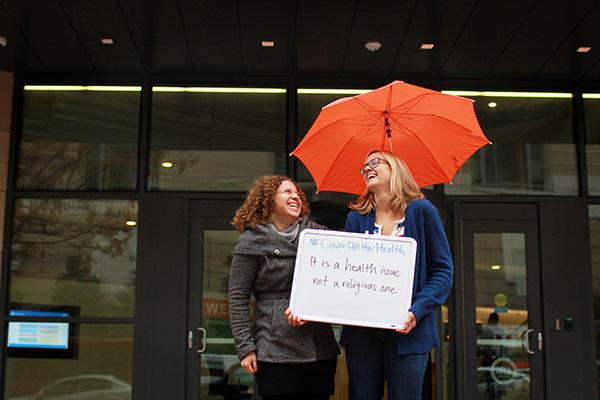Six public health graduate students will protest outside the Supreme Court next week, part of a semester-long push for employers to provide contraception.
Gina Baxter, a second-year graduate student in the Milken Institute School of Public Health, stood outside the New Hampshire Avenue building Tuesday asking students and professors to write a message on a white board about why they support expanding contraception, then pose with the sign and the group’s signature umbrella.
“The umbrella signifies covering everything, not just a portion of women’s health care,” Baxter said.
The group, called Cover All Her Health, was inspired by the June Burwell v. Hobby Lobby decision that companies would not have to provide birth control to female employees if it was against executives’ religious beliefs.
The ruling affects about 90 percent of U.S. companies, according to the Internal Revenue Service.
“We’re afraid that at this rate, pretty soon nobody is going to have birth control coverage,” Baxter said.
Group members encouraged participants to post the photos to social media, hoping to spread the message beyond campus.
Cover All Her Health is looking to gain national attention by working with prominent lawyers and women’s health advocates. The organization has also reached out to big names like Lena Dunham and Sen. Cory Booker, D-N.J. for support.
“Our idea is to start here and expand outward because it’s hard to get the attention of the broader community,” member Rebecca Goldfinger-Fein said.
The students also expect their protest outside the Supreme Court next week will help spread the word about their effort, which they launched with a booth at the Parents’ Weekend block party this fall.
“The Supreme Court made it possible so that employers wouldn’t have to cover birth control. We want to say thank you to the people who did support it, and then also protest the decision,” Goldfinger-Fein said.
Lara Cartwright-Smith, an assistant research professor in the public health school’s Department of Health Policy, said though protesting outside the Supreme Court may not make any change, it “matters for public opinion.”
“Policy makers will see it more here because they’re D.C. students. A lot of people don’t think that it could be a problem until it affects them,” Cartwright-Smith said. “It’s not just about contraception, it’s about giving employees the opportunity to choose their own beliefs.”







